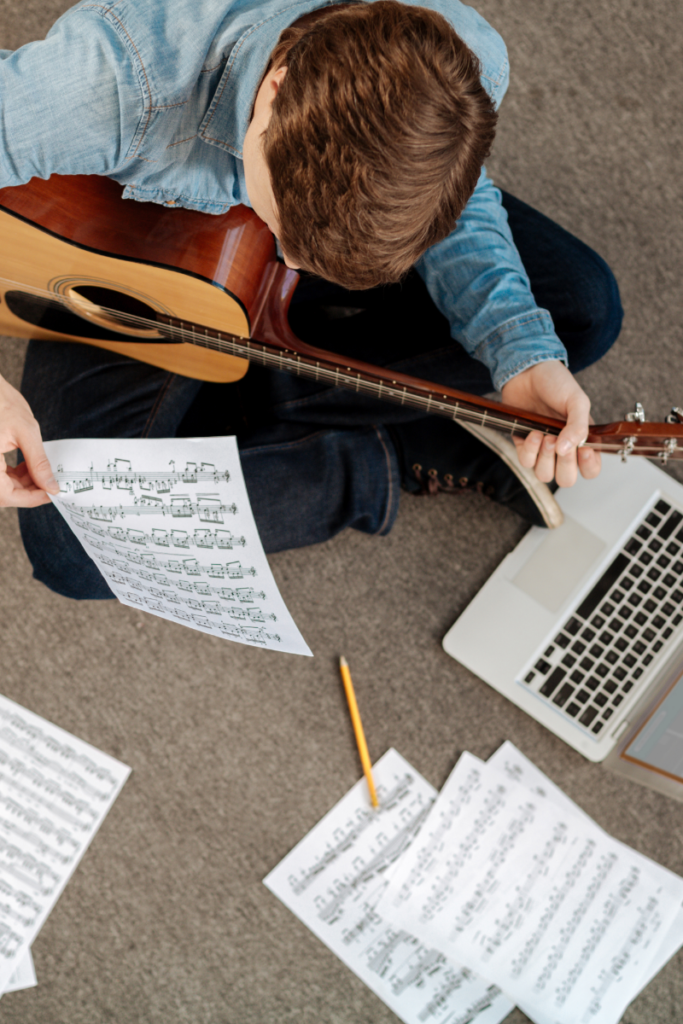5 Techniques for Memorizing Music

Finding techniques for memorizing music can be intimidating to a young musician. Memorizing is one of the more difficult challenges of studying music, for sure.
After all, how can you fully perform something if you haven’t memorized it.
Memorizing pieces of music is important for developing skills and learning techniques for memorizing music will enhance the ability of the student. Additionally, it is essential to memorize music in order to perform it to the best of your ability.
Memorizing Music is to Know it, Inside and Out.
After a piece of music has been learned, the next step before performing it is to memorize it. Why? Because memorizing music is the greatest way to really taking that music into yourself and knowing it intimately, inside and out.
Let’s use a pianist’s experience as an example:
A pianist must play four lines of music at one time. To say there are a lot of moving parts is an understatement.
Additionally, as a pianist progresses in their ability, their pieces will become longer and require page flips in the middle of complex sections of music. Pianists won’t have time to flip the page while they are performing and memorizing their music can aid in this.
This is why our example of pianists are encouraged to memorize their music.
It is also important to mention that, pianists, and every other musician, rely on muscle memory in order to stay ahead of the notes and focus on the performance.
Three Learning Techniques

Having said that music memorization is essential to a solid performance, it is important to remember that everyone learns differently.
There are three learning techniques that people are grouped into: visual, auditory, and kinesthetic. It is important to know what learning style you or your student is in order to learn and memorize music.
Here are five techniques for memorizing music that incorporate different learning styles to help improve performance:
1. Analyze Music Structures:

The biggest step to memorizing music is starting simple with big picture ideas: begin with the structures.
First take a good long look at your piece. Do you notice any block patterns? Is there a theme that seems to continue to come back?
Next, play your piece until you have completely learned it. It will be hard to memorize a piece if there are sections that you still stumble through.
Then break down larger sections into small chunks of a few measures.
Work on playing each of those measures slowly until you are able to not look at the page. Watch your fingers as they move across the keys, noting the pattern of each musical progression.
2. Analyze Chord Progressions:
Analyzing chord progressions are a great way to memorize music as well! Try listening to a recording of the piece you are practicing. Train your ear to listen and anticipate what comes next in the piece you are practicing. Play along with the recording to help your brain and muscles anticipate what comes next. Listening is a great way to learn a piece of music because it involves a different form of processing the information than just visually.
3. Identify Patterns

Patterns are an essential part of music. Each piece is composed of a variety of patterns that are grouped together to make a masterpiece.
Patterns can help your brain to memorize easier by creating a puzzle. You should be able to hear and identify the patterns present in your piece.
For some people it can be even more helpful to color code them while practicing. This can create a visual representation in your memory.
When you go on to memorize, your brain will associate the colors with the patterns and help you to anticipate what notes and rhythms come next.
4. Set Goals
Setting goals is essential in order to meet your memorization deadline.
Start with an end goal for learning the piece.
Give yourself a month or two (depending on the length and difficulty level) to learn the piece.
Work slowly and give yourself more time than you think you need.
Set a goal of a few measures each day and a larger goal of the entire piece in a month. Once you’ve learned the piece you can begin memorizing.
Repeat the same strategies for learning. Practice memorizing small chunks of the piece each day. Add on a new section of each day, while repeating the section you worked on prior.
5. Make it a Game!

Many students learn through actively engaging their mind. Memorizing music can become repetitive and boring.
Therefore, it can be fun and exciting to turn the memorization process into a game.
Don’t be afraid to challenge yourself when memorizing and learning a piece.
Try writing down sections of the piece and place them into a hat.
For example, write down the measure numbers on a piece of paper and reach into the hat for one or two. Challenge yourself to play that measure on the spot. If you nail it, keep the measure out of the hat. If not, put the measure back into the hat in order to try again the next day. Keep a tally of which measures you struggle with the most and see if you can beat yourself!
Another fun game is to involve other friends who are working to memorize their pieces.
You can compete with one another to see who can memorize certain passages first.
Friendly competition is a great way of holding yourself accountable in the memorization process. Friends can help encourage and correct passages that you struggle with. You can return the favor by helping them with passages they are struggling with.
This can create a two way learning system where you see patterns others are struggling with and are able to spot errors within your own learning easier.
Learning and memorizing music is an important skill for the blossoming musician.

Remember that all great musicians started and struggled in the same spot you are currently in, in their development.
Instructors and teachers can be helpful in learning and memorizing music by playing along with their students, correcting passages that are played incorrectly, and using call and response techniques.
Music teachers will assist in memorizing by holding students accountable to their learning and memorization journey. They can demonstrate how to play certain passages and techniques/styles.
If You Are Looking for a Music Teacher and Coach, We Can Help!
Students will find the learning and memorization process easier with the help of a trained professional.
Martucci Music offers trained music teachers who can help assist students learn and memorize their music in a positive and enriching environment, while fostering a love and dedication to the arts.
We offer music lessons and coaching both online anywhere in the country or in person at our physical school in Sacramento, CA.